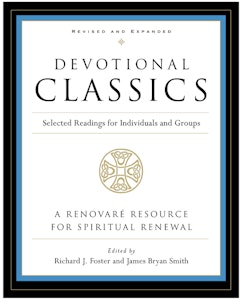Introductory Note:
I am helped by George Buttrick’s words on prayer. It isn’t so much that he is giving me new insights into prayer—in one form or another I have heard it all before. It is that when I read him, I want to pray. Many authors help me understand prayer; few help me practice it.
I’m glad for this feature in Buttrick for I am in need of constant encouragement to keep in the experience of prayer. It is so easy for me to fall back into analysis and debate and avoid “the practice of the Presence.” Maybe you experience the same difficulty. Certainly we can all be grateful for Buttrick’s “hints” on prayer, which nudge us onward in the Way.
Richard J. Foster
Renovaré Founder
 Excerpt from Devotional Classics
Excerpt from Devotional Classics
1. A Simple Regimen of Private Prayer
We now attempt to give some clear and detailed guidance in private prayer. There can be no rules, certainly no binding rules, but only hints. Yet no one need travel an unmarked path. The saints are our teachers; and other people, versed in prayer, who would be aghast to be called saints. Jesus himself is the Teacher.
Prayer is friendship with God. Friendship is not formal, but it is not formless: it has its cultivation, its behavior, its obligations, even its disciplines; and the casual mind kills it. So we offer here, as a guide-map not as a chain, a simple regimen of private prayer.
2. An Orderly Quietness
Prayer begins, not in asking, but in a silent self-preparation. We should not rush into the Presence; the church of private devotion should be entered through the vestibule in an orderly quietness. This comes best as a by-product of a mind focused on God. We say to ourselves, “His light fills the world. It fills this room.” Thus we meditate.
The next step is an act of faith, on which Jesus laid the constant stress: “All things, whatsoever ye ask in prayer, believing, ye shall receive.” In this initial silence of prayer we say to ourselves that whatever we ask “in the nature of Christ” is ours, granted only our earnestness in prayer and life. Always prayer is prefaced by an act of faith. We take counsel with our certitudes, not with our doubts and fears.
3. The Widespread Mercy
In prayer itself there is no fixed order, but both a primary impulse and the experience of praying people show that the first stage may be thanksgiving.
A lecturer to a group of businessmen displayed a sheet of white paper on which was one blot. He asked what they saw. All answered, “A blot.” The test was unfair: it invited the wrong answer. Nevertheless, there is an ingratitude in human nature by which we notice the black disfigurement and forget the widespread mercy.
We need deliberately to call to mind the joys of our journey. Perhaps we should try to write down the blessings of one day. We might begin: we could never end: there are not pens or paper enough in all the world. The attempt would remind us of our “vast treasure of content.”
4. Rooted in Life Beyond Life
Therefore the prayer of thanksgiving should be quite specific: “I thank thee for this friendship, this threat overpassed, this signal grace.” “For all thy mercies” is a proper phrase for a general collect, but not a private gratitude. If we are “thankful for everything,” we may end by being thankful for nothing.
The thanksgiving should also probe deep, asking, “What are life’s abiding mercies?” Thus gratitude would be saved from earthliness and circumstance, and rooted in Life beyond life. “Count your many blessings,” says the old hymn, “and it will surprise you what the Lord hath done.” This prayer should end in glad and solemn resolve: “Lord, seal this gratitude upon my face, my words, my generous concern for my neighbors, my every outward thought and act.”
5. Setting Hooks into the Facts
Prayer may next become confession. A rebound of nature hints that this is a wise order: “God has been exceedingly kind, and I have given him selfishness for love.” True confession is neither self-excoriation — “To be merciless with anyone, even ourselves, is no virtue” — nor casual evasion. Overconscientiousness becomes morbid: underconscientiousness becomes indifference and decay.
Confession to those we have wronged is sometimes, not always, wise: there are circumstances in which such confession would spread and aggravate the hurt. But confession to God, whom we have more deeply wronged, is always wise: he has understanding and love.
Our sin is against the Living Order, and we have neither inward peace nor inward power until we have offered prayers of penitence. Confession, like thanksgiving, should be specific. It should not be ruthless, but it should not excuse: it should set hooks into the facts. “I confess this sharp judgment, this jealousy, this cowardice, this bondage of dark habit, this part in the world’s evil.”
6. New Freedom in His Grace
Contrition is not easy work: it is surgery. But, like surgery, it is not an end in itself: the wise prayer of confession always leads to an acceptance of God’s pardon … God does not wish us to remember, except as a reminder of our dependence, for he is willing to forget anything.
It might be wise to rise from kneeling at this point in the prayer as a token of our acceptance of God’s pardon, our sure faith in his absolution, and our new freedom in his grace. That standing erect might also symbolize both our resolve to make wise restoration insofar as we have power to mend our blunders, and our sincere renunciation of our sins.
Confession is incomplete without that resolve. Our will, however feeble it may be, must descend squarely on the side of a new life. Otherwise even our penitence may become a self-deceit and an abuse of God’s goodness. But true confession is a cleansing of the soul.
7. Love Sees Faces
Then may follow a prayer of intercession, without which the most earnest prayer might sink into selfishness. The Lord’s Prayer in almost every phrase keeps us mindful of our neighbors: “Our Father” … “our daily bread” … “our trespasses.”
Private intercession should be specific. “We humbly beseech Thee for all sorts and conditions of people,” is an appropriate phrase in a collect — which, as the very word indicates, draws all worshipers into one act of devotion, and provides a form into which each worshiper may pour his secret prayer — but it is out of place in individual petition.
Genuine love sees faces, not a mass: the good shepherd “calleth his own sheep by name.” Intercession is more than specific: it is pondered: it requires us to bear on our heart the burden of those for whom we pray.
8. Its Heart Entreaty
Whose name should come first? Perhaps the name of our enemies. The injunction of Jesus is plain: “Pray for them which despitefully use you.” He told us that worship is vain if we are embittered; that we should be wise to leave our gift before the altar, go to make peace with our neighbor, and then worship. Only then can we truly worship. So the first intercession is, “Bless So-and-so whom I foolishly regard as an enemy. Bless So-and-so whom I have wronged. Keep them in Thy favor. Banish my bitterness.”
Intercession also names the leaders of mankind in statecraft, medicine, learning, art, and religion; the needy of the world; our friends at work or play, and our loved ones. A sense of responsibility may prompt us to prepare a chart of intercession, so that day by day we may enter earnestly into the needs of the world, and not forget nor fail anyone who closely depends upon our prayers.
So true intercession is specific and pondered. It is also daring: it carries on its heart-entreaty the crisis of the world. Like thanksgiving, it is not complete without our vow. Sincere prayer-in-love is never in vain.
9. Before Eternal Eyes
The fourth order in our prayer may be petition. It comes last, not because it is most important, but because it needs the safeguard of earlier prayer. We should not fear to lift our earthly needs before Eternal Eyes, for we are held in Eternal Love.
But we should fear the encroachment of a selfish mind. Petition is defended against that threat if first we give thanks, confess our sins, and pray for our neighbors. Then the petition may have free course.
Sometimes, in sorrow, dread, or helplessness, it will be a crisis cry of creaturehood — a beating on heaven’s door with bruised knuckles in the dark. Sometimes it will be friendship-talk with God about the affairs of everyday. Surely both prayers would be approved by Christ: his disciples cried in their extremity, “Lord, save us”; and day by day they spoke with him about their struggles, enigmas, and joys of the journey.
To try to thwart the prayer of petition is to deny human nature. The New Testament has better wisdom: “Be overanxious for nothing; but in everything by prayer and supplication with thanksgiving let your requests be made known unto God.” Yet petition should grow in grace so as to “covet earnestly the best gifts”; and it should always acknowledge that our sight is dim and that our purposes are mixed in motive. It should always conclude with, “Nevertheless not my will, but thine, be done.”
10. Friendship Held in Reverence
The intervals of these four prayers should be filled by meditation. After thanksgiving we should contemplate God’s abounding goodness, and await his word concerning his own gifts. After confession we should adore the pardoning Love made known in Christ, and listen for his guidance. After intercession we should pause to try to see the whole world’s need as Christ saw it from his cross. After petition we should wait again to meditate upon the Will.
Prayer is listening as well as speaking, receiving as well as asking; and its deepest mood is friendship held in reverence. So the daily prayer should end as it begins — in adoration. The best conclusion is, “In the name of Jesus Christ: Amen.” For in the name or nature of Jesus is our best understanding of God, and the best corrective of our blundering prayers. The word “Amen” is not idle: it means “So let it be.” It is our resolve to live faithfully in the direction of our prayers, and our act of faith in God’s power.
Excerpts taken from Devotional Classics: Selected Readings for Individuals and Groups (Richard J. Foster & James Bryan Smith, Editors. HarperCollins, 1993.). Originally from The Essentials of Mysticism by Evelyn Underhill, published 1920.
Photo by Marc-Olivier Jodoin on Unsplash
Text First Published December 1992 · Last Featured on Renovare.org June 2023


